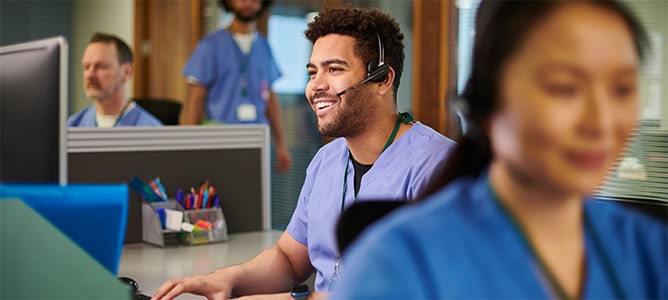Search Ashworth College

Job opportunities are no longer solely defined by formal education or years of experience. A prime example of this is the field of medical coding. Despite seeming like a specialized profession, you can enter into it even without prior experience!. This guide will help you understand how to become a medical coder when you don’t have professional experience. Let's dive in.
Just because you haven't worked as a medical coder before doesn't mean your past experiences aren't valuable. Think about the skills you gained in previous jobs that can translate to medical coding. Here are some examples of non-medical roles and the skills you learned that could help in a medical coding job:
When transitioning to a medical coding role from a different field, the key is to focus on the transferrable skills you've gained from past experiences. Make sure to highlight these skills in your resume and during interviews to show potential employers how they can be applied to a medical coding role.
Learn more: Medical Billing & Coding Day in the Life
Employers value personality and character as much as hard skills. Showcase soft skills such as attention to detail, communication skills, problem-solving, and a capacity for learning new things.
Resume tip! Use the words or phrases in bold on your resume. Be sure to link these skills and interests directly to the job requirements when crafting your resume or cover letter. This makes it easier for potential employers to see how your unique skill set could benefit their team and can often offset your lack of specific medical coding experience.
Consider starting with entry- level positions at a healthcare organization. These roles can offer valuable exposure to the industry, enabling you to understand the ins and outs of medical coding while gaining practical experience. Here are some entry -level medical industry jobs:
Learn more: Medical Assistant vs Medical Coder: Which is Right for You?
While in these roles, you could work towards earning your certification in medical coding. This would demonstrate to employers that you have the necessary knowledge for a coding position, and it can often be obtained while you are gaining experience in one of these entry-level roles.
Employers may look for candidates with ICD (International Classification of Diseases) codes, CPT (Current Procedural Terminology) codes, and HCPCS (Healthcare Common Procedure Coding System) codes. It’s also a good idea to familiarize yourself with human anatomy and physiology. You can study the codes and mention your familiarity with them on your resume.
Knowledge is power. Stay current with industry trends by subscribing to medical coding e-newsletters, joining a medical coding Facebook group or Subreddit, or pursuing certifications.
Learn more: Earn your medical coding professional certification for under $2,000 at Ashworth College.
Beyond medical coding skills, you can make yourself more marketable by becoming proficient in related areas such as Excel, data entry, and healthcare administration. Pursuing relevant certifications can also make you a more competitive candidate.
If your end-goal is to become a medical coder, then a step to achieving that goal is to obtain one of the above certifications. Depending on the healthcare organization where you work–or want to work–they may want you to receive a specific certification or bundle of certs. Reach out to your current employer’s hiring department to make sure you know what certifications and skills you’ll need. If you don’t work in healthcare or your facility doesn't have in-house medical coders, a good place to find out job requirements is to check out job listings on Indeed or LinkedIn.
Learn more: Which Healthcare Certifications Pay the Most
While the following certifications can make your resume stand out, they are not a replacement for specific medical coding certifications and experience:
Make sure to carefully review the job description for any coding role you apply for, as different employers might value different certifications.
When it comes to applying for jobs, it’s a numbers game. The more jobs you apply for, the more likely you are to get an interview. And, the more interviews you have, the more likely you are to get a job offer. There are tons of reasons to apply for a medical coding job even if you don’t feel ‘ready:’
The goal is not to misrepresent your abilities, but to present yourself as a capable and promising candidate, even if you don't check every box. It's also important to focus on the essential qualifications: if a job requires a specific certification or years of experience that you don't have, it might be a hard requirement, and applying without them may not yield positive results. But apply anyway! You don’t know what their applicant pool looks like, and your other qualifications may make you stand out even among more qualified candidates.
The job market has openings for certified coding positions and non certified medical coders. Non certified coders are exactly that: entry-to-mid level medical coders working in larger healthcare organizations. Non certified coders play a valuable role within any medical facility.
Entry-level jobs, like non-certified medical coder, coding assistant, or medical records clerk, are good places to start. You can also search for jobs that involve aspects of medical coding, such as data entry and transcription roles in healthcare organizations.
Taking the leap to become a medical coder without experience might seem daunting, but with the right mindset, it can be possible. Just remember, your value isn't solely determined by formal education or years of experience, but also by your character, adaptability, and commitment to learn.
So why wait? Begin your journey towards becoming a medical coder today, and remember, Ashworth College is here to support you every step of the way. Check out our Ashworth College Medical Coding Program to take the first step toward learning the medical billing and coding skills that could help you stand out when you’re applying for jobs!
Let's talk about your educational goals. Call 1-800-957-5412